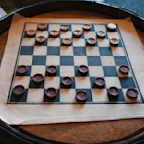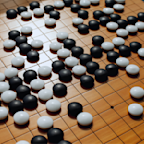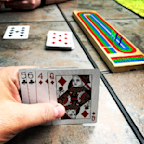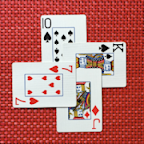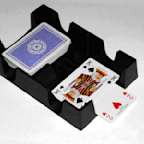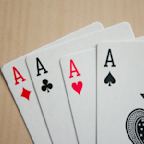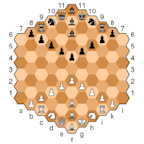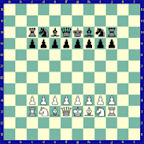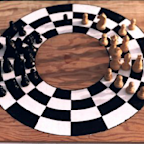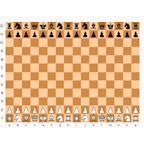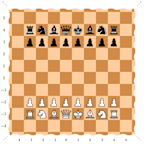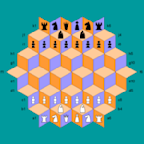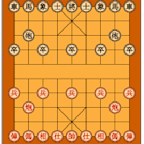Search results
Richard Lang's ChessGenius programs have a long history of being the strongest in the world. They have won Computer Chess World Championships 10 times. Perhaps ChessGenius's greatest achievement came in August 1994 when it shocked the Chess World and became the first program ever to beat a World Champion (Gary Kasparov) at a non-blitz time level.
- Desktop Pc's
ChessGenius made headlines all around the world by beating...
- Android
ChessGenius is a world class chess playing program for...
- Deutsch
Bitte wählen Sie aus. ChessGenius für iPhone/ iPad / iPod...
- ChessGenius for Windows Mobile
ChessGenius has superb playing strength and is packed with...
- ChessGenius for Palm OS
ChessGenius is a world championship winning chess program...
- ChessGenius for Windows Phone
Chess Clocks Total White and Black time and move time. Make...
- Desktop Pc's
- Cyrus
- Psion
- Mephisto and Genius
- Resume
- Publications
- External Links
Lang's first chess program, Cyrus, was written in Z80 Assembly. It had an astonishing debut at the 2nd European Microcomputer Chess Championship at the PCW Show in September 1981 in London, winning all five games and the tournament. Lang immediately was offered two contracts by David Levy and Kevin O’Connell, one for Cyrus, and one to work as progr...
In about 1983 Richard Lang started to write his new program Psion for 68000 based processors. He was about to abandon the work for Intelligent Software, who continued their own work by owning the Cyrus brand by primary programmer Mark Taylor, yielding in Cyrus 68K. Psion Chess was marketed first by Sinclair Research for Sinclair QL computers and la...
In 1985 Lang started to collaborate with Hegener & Glaser and Ossi Weiner, porting Psion to their dedicated Mephisto chess computers . Psion evolved to Chess Genius, also ported to PC's for the MS-DOS operating system, and later to Windows . Lang's Mephisto programs dominated the microcomputer chess scene from the mid 80s until the beginning of the...
In 2002 Richard Lang founded his own company, merchandising Chess Genius for various platforms with focus on PDA and mobile phones, recently also for Android . In an 2003 interview, Richard Lang stated that there is still much of Cyrus in current versions of Chess Genius. For example, he had never used quiescence searches and relied instead on a st...
Tony Harrington (1983). Winner Takes All. Personal Computer World, September 83, pdf hosted by Mike WattersGöran Grottling (1987). Mr. Lang, wo bleibt die Tiefe? Ein Interview mit Richard Lang. Modul 4/87, pdf hosted by Hein Veldhuis (German, translation from Swedish PLY magazine)Richard Lang (1989). The Ninth World Microcomputer Chess Championship. ICCA Journal, Vol. 12, No. 4Staff (1995). An Interview with Richard Lang. Computer Chess Reports Vol. 5 No. 3+4pp. 63Chess Computers - The UK Story from Chess Computer UK by Mike WattersChessGenius is the name of a chess-playing computer program written by Richard Lang who has in the past written programs that have won the World Computer Chess Championship on 10 occasions. [1]
a series of chess engines by Richard Lang, written in assembly for various processor architectures such as Motorola 68000 and Intel 8086 and x86, and successor of Lang's dedicated 68000 based Mephisto Vancouver program incorporating small improvements, the 8086 version first released in 1992 as PC program running under 16-bit MS-DOS.
Richard Lang's first chess program, written in Assembly for a Z80 CPU. Starting programming in January 1981, his tournament debut at the 2nd European Microcomputer Chess Championship at the PCW Show 1981 in London was already a breakthrough.
The ChessGenius contains - giving its name - one of the most famous chess engines of all times: ChessGenius by Richard Lang. The Englishman, with his 10 world championship titles in computer chess, is without doubt considered one of the most successful chess programmers of all time.
People also ask
How did Richard Lang become a chess player?
What was Richard Lang's first chess program?
What was ChessGenius' greatest achievement?
Did ChessGenius beat Garry Kasparov?
Sep 9, 2020 · (born 1956 in England) is a chess software programmer. He was considered the best chess software programmer in the years 1980 to 90. Richard Lang studied physical sciences at Imperial College London, where he learned Fortran programming.

